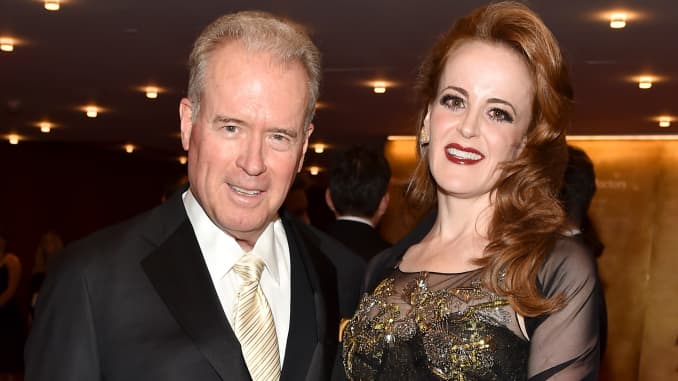While Charles Koch and his late brother David have dominated Republican fundraising in recent decades, the billionaire Mercers’ recent strategic investments in far-right candidates bought them a disproportionate level of influence in the Republican Party before culminating in an effort to subvert the election that fueled the deadly Capitol siege.
Salon: Four years before Sen. Josh Hawley, R-Mo., pumped his fist to a supportive mob that would soon overrun the Capitol Police and hunt lawmakers through the halls of Congress, the former Missouri attorney general needed a deep-pocketed patron.
Naturally, he called on the man who helped bankroll former President Trump’s rise: hedge-fund billionaire Robert Mercer, whom he would soon describe as a friend while name-dropping him to court support from far-right figures like Steve Bannon, a longtime Mercer ally.
It’s unclear what came of Hawley’s meeting with Mercer, but the Club for Growth, which has received millions from the Mercer family, and the Senate Conservatives Fund, which also got Mercer donations, quickly became Hawley’s biggest financial backers, by far.
Mercer’s daughter Rebekah kicked in a near-maximum donation to his 2018 Senate campaign for good measure.
“The Mercers laid the groundwork for the Trump revolution,” Bannon told The New Yorker in 2017. “Irrefutably, when you look at donors during the past four years, they have had the single biggest impact of anybody, including the Kochs.”
Steve Schmidt, a former Republican strategist and co-founder of the anti-Trump Lincoln Project, sees it differently.
Rebekah Mercer, he said in an interview with Salon, is the “chief financier or one of the chief financiers of the fascist movement, and that’s what it is.”
Hours after the pro-Trump mob stormed the Capitol, killing five people and injuring dozens of police officers in a futile bid to stop the counting of electoral votes, Hawley joined with top Mercer beneficiaries in objecting to the results to back Trump’s “big lie” that the election was somehow stolen.
There was Sen. Ted Cruz, R-Texas, whose super PAC got $13.5 million from the Mercers during the 2016 presidential campaign — before the family dropped another $15.5 million to back Trump.
There was House Minority Leader Kevin McCarthy, R-Calif., defending the majority of the GOP House caucus voting to overturn legal election results after his Congressional Leadership Fund received $1.5 million from the Mercers.
And there was Rep. Mo Brooks, R-Ala., who received $21,600 from the Mercers before speaking at the rally that preceded the riot and objecting to the results.
Brooks was later named by “Stop the Steal” organizer Ali Alexander as having helped orchestrate the event, though his office said he has “no recollection communicating in any way with whoever Ali Alexander is.”
Alexander himself may have benefited from the Mercers’ millions while working for the Black Conservative Fund, a small and mysterious group that received $60,000 from Robert Mercer in 2016.
Though the group did not raise any money in 2020, it promoted the White House rally to tens of thousands of followers, according to CNBC.
The Mercers funded numerous key players who helped foment the Jan. 6 insurrection, though their full involvement remains unclear.
Along with far-right candidates and groups, they have also funded the far-right social network Parler, which was used to coordinate the Capitol siege, and Cambridge Analytica, the now-defunct London-based data firm that stole Facebook user data to help Trump’s 2016 campaign target potential voters.
“As I discovered first-hand, the Mercers are exceptionally skillful at obfuscating and masking their political enterprises,” David Carroll, a professor at The New School in Manhattan who sued Cambridge Analytica for his data in London, said in an email to Salon. “I marveled at how their ownership of Cambridge Analytica was effectively shielded from the U.K. courts where they were prosecuted.”
Now that the Mercers have survived the scrutiny of the Federal Trade Commission and former special counsel Robert Mueller’s investigation, Carroll added, “I would assume the family has doubled-down on investing in its own privacy.”
Schmidt agreed that “it’s hard to keep track of the money” the Mercers have doled out to their pet causes.
“In this movement, the money is a fundamentally important part of it. It fuels the movement and that movement is an extremist movement,” he said. “Is there a better than even chance that the Mercer money is flowing, like so many tributaries, right into a larger seditious stream on this? Of course there is.”
Lax laws surrounding dark money donated to nonprofit entities mean it will likely be “several years before the public will have a complete sense of how much the Mercers spent,” wrote The Intercept’s Matthew Cunningham-Cook.
Publicly available data shows that the Mercers helped fund numerous players who pushed the “big lie.”
The family donated $3.8 million to Citizens United, which is run by longtime Trump adviser David Bossie, who was tapped to lead the former president’s legal challenges.
Though the Mercers have pulled back their financial support in recent election cycles amid growing scrutiny, they donated $300,000 during this past cycle to the Republican National Committee, which joined Trump’s legal battle.
The Mercers were also the top donors to Arizona Republican Party chairwoman Kelli Ward, a devoted Trump loyalist, The Intercept reported last week.
Ward joined the lawsuit led by the Republican attorney general of Texas that sought to overturn the results of the election in multiple states and spoke at a December rally that featured Alexander to push Trump’s election conspiracy theories.
On Twitter, Ward promoted her appearance at a “Stop the Steal” rally alongside former national security adviser Michael Flynn, who urged Trump to invoke martial law to rerun the election and posted the hashtag “#CrossTheRubicon,” a phrase that refers to Julius Caesar marching his army into Rome to declare himself a dictator.
The Arizona GOP also promoted Alexander’s tweets, which included his declaration that he was “willing to give up my life for this fight.”
“Live for nothing, or die for something,” the party tweeted about a month before the Capitol riot.
More recently, Rebekah Mercer co-founded Parler, ostensibly a “libertarian” moderation-free social network that quickly became a megaphone for far-right figures like Alexander and fellow organizer Alex Jones, both of whom had been banned from mainstream social networks for spreading disinformation.
Alexander, Jones and others used Parler to spread falsehoods about the election while others simply trafficked in white supremacist content, according to the Anti-Defamation League.
“Holocaust denial, antisemitism, racism and other forms of bigotry are also easy to find,” the ADL said.
Parler was used by some of the Capitol rioters to plan and coordinate the attack.
The site was briefly taken offline by Amazon before finding a new host, though its apps have been removed from the Apple and Google app stores.
Rebekah Mercer said in a Parler post that she started the social network to combat the “increasing tyranny” of our “tech overlords,” slamming mainstream social networks over “data mining” — which is exactly what the Mercers’ former company, Cambridge Analytica, exploited to steal Facebook users’ personal data to help Trump in 2016.
Although Mercer touted Parler’s protection of user data, hackers were able to easily gain access to unsecured user data, which showed that Parler users had penetrated deep inside the Capitol and shared videos and photos of their crimes.
Before Trump, the family for years bankrolled Breitbart News, formerly run by Steve Bannon, who affectionately termed it the platform of the alt-right.
Along with Breitbart, which received a $10 million investment from the family, the Mercers also funded Bannon projects like Glittering Steel, a film production company, and the Government Accountability Institute, whose president authored the anti-Hillary bestseller “Clinton Cash” and later pushed discredited conspiracy theories about Joe Biden and his son Hunter’s work overseas.
Bannon’s appointment to Trump’s White House, after Rebekah Mercer pushed for him to take over Trump’s campaign, was celebrated by the Ku Klux Klan and American Nazi Party.
Though Bannon fell out with Trump after a few months in the White House, both he and Breitbart aggressively pushed Trump’s false narrative following the election. (Bannon got a last-minute pardon from Trump in a federal fraud case.)
The Mercers also funded conservative groups that helped push Trump’s election lies and spread hate.
Rebekah Mercer reportedly led a major reorganization of Trump’s 2016 campaign, connecting him with Bannon and former Cruz adviser Kellyanne Conway, who would replace Paul Manafort at the helm of the team.
Mercer, who also served on the Trump transition’s executive committee, pushed for Trump to hire Michael Flynn, a retired Army lieutenant general who was forced to resign less than a month into Trump’s presidency amid a criminal investigation and now spreads QAnon conspiracy theories online.
It’s unclear why the Mercers fund so many far-right causes, though sources close to the family told Politico in 2016 that they “harbor a deep and abiding enmity toward the political establishment.”
Robert Mercer has been described as a “reclusive” former IBM computer scientist who made his fortune as co-CEO of the algorithmic trading company Renaissance Technologies.
Sources close to him told The New Yorker that he is a conspiracy theorist who believes the Clintons had opponents murdered and were involved in a drug-running ring with the CIA.
He has also described the Civil Rights Act as a mistake, arguing that Black people were better off financially before the passage of the landmark law, according to the same New Yorker report.
Racism in the U.S. is “exaggerated,” Mercer reportedly said, attributing most of it to “Black racists.”
He has likewise argued that climate change is not a problem and would actually be beneficial for the Earth, sources told the magazine.
“Bob believes that human beings have no inherent value other than how much money they make,” David Magerman, a former colleague of Mercer who later sued him for unlawful termination, told the New Yorker. “A cat has value, he’s said, because it provides pleasure to humans. But if someone is on welfare they have negative value. If he earns a thousand times more than a schoolteacher, then he’s a thousand times more valuable.”








